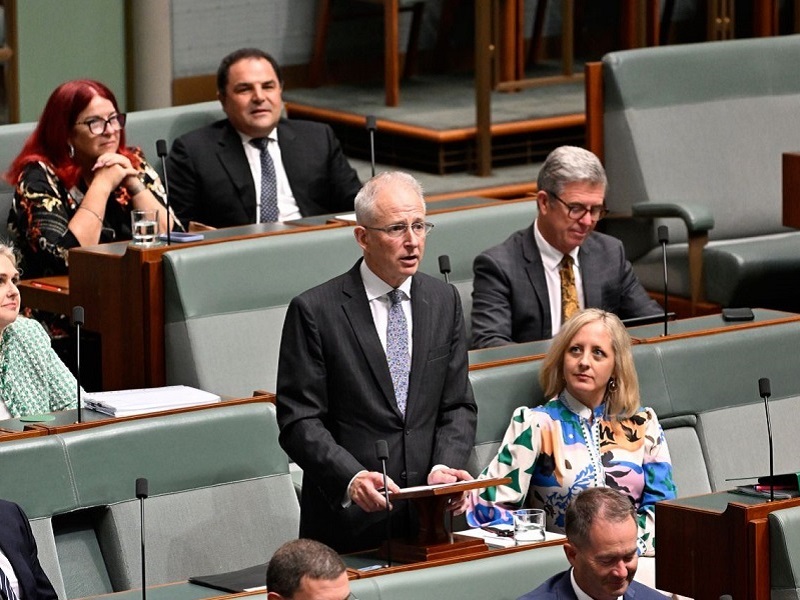Outgoing Liberal MP Paul Fletcher has bid farewell to federal parliament, using his final speech to reflect on the importance of science and technology as a driver of human progress.
After a political career spanning more than 15 years in parliament, Mr Fletcher also used his valedictory speech to calm fears over AI and issue a warning over the fragility of telecommunications networks.
“As the expression goes, predictions are hard, especially about the future, but we can see a clear pattern from every previous wave of new technology,” Mr Fletcher said of AI on Monday.

A self-proclaimed Liberal moderate, Mr Fletcher was elected as the member for the Sydney seat of Bradfield in 2009 after an extensive career outside of politics, including eight years at Optus.
He served in numerous ministerial roles in the Abbott, Turnbull and Morrison Liberal governments over the years, culminating in his appointment as Communications minister in 2019.
It was during his early days as Communications minister that he experienced his most challenging time as minister: the catastrophic Black Summer bushfires of 2019-20 and the outages that followed.
“On the worst day, around 150 mobile base stations were off the air across New South Wales, Victoria and South Australia. No mobile coverage means no EFTPOS and no capacity to call or text for help,” Mr Fletcher said.
“It was a reminder of something we too often overlook: the sustainability of the physical telecommunications networks which underpin the internet and, in turn, the digital economy.”
Mr Fletcher said that in many places the networks are “vulnerable, with little or no network redundancy”, arguing that it is both an “economic issue as well as a network design issue”.
“The margins made by the telcos in building and operating networks are modest, while the global tech firms which write over those networks are making supernormal returns. This disparity presents a growing risk, in my view, and needs policy attention.”
But Mr Fletcher, who has been a keen supporter of the local technology ecosystem during his time in opposition, is overwhelmingly optimistic on technology and its potential to transform society.
“When I reflect on the unbelievable changes just in my own lifetime, to me the evidence of scientific and technological advancement improving our lives is absolutely compelling,” he said on Monday.
“Do I think all applications of technology are positive? Of course not. But consider the internet – it has transformed the way we live, work, meet our partners, entertain ourselves, do business and a hundred other things besides.”
Mr Fletcher said that although “there has been alarm that [AI] would destroy jobs”, it has, like other technologies before it, “changed jobs and created new jobs while increasing prosperity”.
Climate change has similarly presented a challenge, he said, but “science and technology will be the way” it is eventually overcome, while not discounting the need to “phase out fossil fuels”.
“I have to say, I’m even more optimistic now, after spending two-and-a-half years as shadow minister for science, visiting supersmart scientists, researchers and businesspeople all around the country,” he added.
Mr Fletcher welcomed the Albanese government’s continued support of the eSafety Commissioner, a position established while he was parliamentary secretary to former Communications minister Malcolm Turnbull.
He also backed the “more sensible approach to extending the NBN fibre rollout”, referring to the government’s pledge to upgrade hundreds of thousands of NBN connections should it win government at the election.
“Instead of building fibre to every home, now there is fibre built down the middle of the street, with the connection to the customer’s home done only when the customer orders a high-speed broadband service – a much more efficient use of taxpayers’ capital.”
But in a parting shot, Mr Fletcher criticised the government for its approach to the News Bargaining Code, which he worked to develop with former treasurers Josh Frydenberg and Scott Morrison.
The Albanese government is preparing to replace with News Media Bargaining Incentive with a News Media Bargaining Incentive, after Meta refused to renew deals to pay news publishers.
“It is a shame that the current government has not been able to continue our work effectively,” he said, adding that the “process we designed worked as intended, securing some $200 million in payments from the platforms”.
Mr Fletcher also used his speech to call for digital voting in parliament, having formed “clear views about how this place works and how it could improve” during his time as manager of Opposition business in the House.
He envisions replacing the current “inefficient” process with one that uses either a smartcard or a phone and a reader to capture and tally votes in “a minute or two” once the chamber doors are locked.
Mr Fletcher said he was leaving parliament with a “deep sense of gratitude for the opportunity to serve in parliament and as a Cabinet minister”, signing off with thanks to colleagues.
“It has been a privilege to serve in this place for 15 years. It is time for renewal. Thank you. It has been great. Keep in touch,” he told parliament for the last time.
Do you know more? Contact James Riley via Email.

